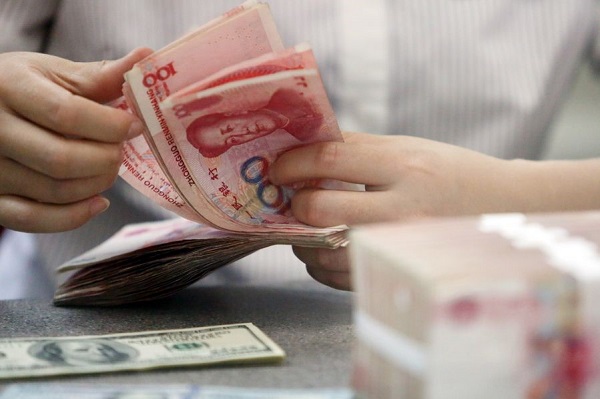Draft law on financial stability targets risk

A worker counts Chinese currency renminbi at a bank in Linyi, East China's Shandong province. [Photo/Xinhua]
A draft law on financial stability has been submitted to the top legislature for deliberation, marking the country's latest push to strengthen the prevention and resolution of financial risk amid headwinds and a harsher external environment.
Experts said the draft law seeks to unify the "scattered" set of rules on handling financial risk and provide a legal basis for the prevention and resolution of major financial risk, which will help improve market expectations, promote vigorous development of the financial market and support healthy development of the real economy.
The draft law was submitted for its first reading to the ongoing session of the Standing Committee of the National People's Congress on Tuesday. In general, a draft becomes law after it is reviewed by the top legislative body three times.
Consisting of six chapters and 49 articles, the draft outlined a cross-agency working mechanism for maintaining financial stability through a top-level design. It proposes the establishment of a financial stability fund for maintaining financial security and stability, specifies the responsibilities of each party involved, and requires improved division and coordination of duties among different departments, and between the central and local governments.
Liu Guoqiang, deputy governor of the People's Bank of China, the country's central bank, said China is likely to roll out the law on financial stability in 2023 — a major step for the country to strengthen financial risk prevention.
The law will help enhance the country's capability to manage major risks and play an important role in fending off systemic financial risk, Liu said during a recent annual conference on China's economy, held by the China Center for International Economic Exchanges.
Dong Dengxin, director of the Wuhan University of Science and Technology's Finance and Securities Institute, highlighted the importance of building a cross-branch working mechanism for financial stability, saying it will contribute to the improvement of China's financial safety net and maintain the overall stability of the financial system.
The draft law comes amid mounting pressure and risk from a harsher domestic and external environment. Experts warned that the economy faces multiple cyclical and structural headwinds, saying recessions across key advanced economies, a downturn in the global manufacturing cycle, and a protracted domestic real estate correction will weigh on China's near-term outlook.
Given the more complicated international situation, Lou Feipeng, senior economist at Postal Savings Bank of China, said it is necessary to safeguard the bottom line of preventing systemic financial risk, and the draft law will help build such a working mechanism to fend off such risk.
Lou said the draft law will not only provide legal support for the establishment of a sound market-based and legalized risk prevention and resolution mechanism, but also help offer a stable environment for economic development and strengthen the real economy by effectively preventing and handling financial risk.
Lou's views were echoed by Yang Haiping, a researcher at Central University of Finance and Economics' Institute of Securities and Futures, who said the new law will provide legal support for dealing with challenges both at home and abroad.
When it comes to the weak property sector, Yang said the new law will also help stabilize the real estate sector.
Citing the government's stepped-up efforts to stabilize the property sector, Yang said such measures will ease financing conditions for real estate developers and reduce the strain on developers' balance sheets.
He added the introduction of the new law will require relevant departments and local governments to effectively deal with financial risk from the property sector.
- Top legislature schedules session for December
- China's top legislator holds talks with president of Luxembourg parliament
- China's top legislator meets with French president
- China, Maldives pledge to enhance exchanges between legislative bodies
- Senior Chinese legislator meets Portugal's PSD delegation



